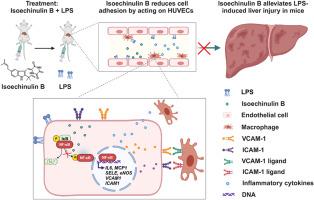Isoechinulin B 是一种来自南极真菌的天然产物,可通过抑制细胞过度粘附来减轻急性肝损伤。
IF 4.2
3区 医学
Q1 PHARMACOLOGY & PHARMACY
引用次数: 0
摘要
白细胞与内皮细胞之间异常的细胞粘附与多种炎症相关疾病的发生密切相关,而粘附分子在其中扮演着至关重要的角色。破坏细胞粘附力可以直接或间接抑制细胞的过度粘附,从而产生治疗效果。然而,目前临床上可用的细胞粘附拮抗剂寥寥无几。最大的挑战之一就是开发新型高效的细胞粘附抑制剂。最近,微生物来源的天然产物的抗炎药理活性也受到越来越多的关注。在这里,我们从南极真菌 Aspergillus sp. CPCC 401072 中获得了一种潜在的细胞粘附抑制剂异胆苷 B,它是一种吲哚二酮哌嗪衍生物,具有抗细胞粘附的活性。Isoechinulin B通过抑制NF-κB信号通路的激活,降低血管内皮粘附分子1(VCAM-1)和细胞间粘附分子1(ICAM-1)的表达,从而抑制白细胞和内皮细胞之间的细胞粘附,减少巨噬细胞在肝脏中的浸润,显著减轻脂多糖诱导的小鼠急性肝损伤。结论:Isoechinulin B是从极端环境中发现的真菌中提取的一种新型细胞粘附抑制剂。本文章由计算机程序翻译,如有差异,请以英文原文为准。

Isoechinulin B, a natural product from Antarctic fungus, attenuates acute liver injury by inhibiting excessive cell adhesion
Abnormal cell adhesion between leukocytes and endothelial cells is closely associated with the development of numerous inflammation-related diseases, with adhesion molecules playing a crucial role. The disruption of cell adhesion directly or indirectly inhibits excessive cell adhesion and thus produces a therapeutic effect. However, there are only a few clinically available antagonists of cell adhesion. One of the biggest challenges is the development of novel and efficient cell adhesion inhibitors. Recently, the anti-inflammatory pharmacological activity of natural products of microbial origin has also received increasing attention. Here, we obtained a potential cell adhesion inhibitor isoechinulin B, an indole diketopiperazine derivative, from the Antarctic fungus Aspergillus sp. CPCC 401072, which is active against cell adhesion. Isoechinulin B decreased the expression of vascular endothelial adhesion molecule 1 (VCAM-1) and intercellular adhesion molecule 1 (ICAM-1) by inhibiting the activation of the NF-κB signaling pathway, thereby inhibiting cell adhesion between leukocytes and endothelial cells to reduce macrophage infiltration in the liver and significantly attenuate lipopolysaccharide-induced acute liver injury in mice.
Conclusion
Isoechinulin B is a novel cell adhesion inhibitor derived from fungi found in extreme environments.
求助全文
通过发布文献求助,成功后即可免费获取论文全文。
去求助
来源期刊
CiteScore
9.00
自引率
0.00%
发文量
572
审稿时长
34 days
期刊介绍:
The European Journal of Pharmacology publishes research papers covering all aspects of experimental pharmacology with focus on the mechanism of action of structurally identified compounds affecting biological systems.
The scope includes:
Behavioural pharmacology
Neuropharmacology and analgesia
Cardiovascular pharmacology
Pulmonary, gastrointestinal and urogenital pharmacology
Endocrine pharmacology
Immunopharmacology and inflammation
Molecular and cellular pharmacology
Regenerative pharmacology
Biologicals and biotherapeutics
Translational pharmacology
Nutriceutical pharmacology.

 求助内容:
求助内容: 应助结果提醒方式:
应助结果提醒方式:


